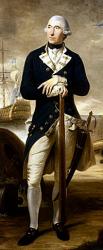Planning worship?
Check out our sister site, ZeteoSearch.org,
for 20+ additional resources related to your search.
- |
User Links
Person Results
‹ Return to hymnal

Export as CSV
Richard Kempenfelt

1718 - 1782 Hymnal Number: d15 Author of "Burst, ye emerald [pearly] gates, and bring" in Hymns and Spiritual Songs for the Use of Christians Kempenfelt, Richard, of Swedish descent, was born Oct., 1718. In Jan., 1741, he obtained a lieutenant's commission in the British Navy. He became captain in 1757, and admiral in 1780. He was drowned in the "Royal George," which sank in harbour at Portsmouth on Aug. 29, 1782. Admiral Kempenfelt was an admirer of Whitefield and the Wesleys, and interested himself much in evangelistic work. His hymns were published as Original Hymns and Poems. By Philotheorus. Exeter, printed by B. Thorn, 1777, and were dedicated "To the Rev. Mr. Fletcher, Vicar of Madeley, in Shropshire." They were reprinted, with a Preface, by D. Sedgwick, in 1861. Although most of these hymns are given in the older collections, only a few re¬main in modern hymn-books, and, including centos, are:—
1. Bear me on Thy rapid wing. Praise to Jesus in Heaven.
2. Burst, ye emerald gates, and bring. Praise to Jesus in Heaven.
3. Gentle Spirit, waft me over. Heaven desired.
4. Hail, Thou eternal Logos, hail. Adoration of Jesus.
5. Hark, 'tis the trump of God. The Last Day.
6. O my Redeemer, come. The Last Day.
Of these Nos. 1 and 2 are from the same hymn; and Nos. 5 and 6 also from another. The original texts of Nos. 3, 5, and 6 are in Lyra Britannica 1867, pp. 349-52.
--John Julian, Dictionary of Hymnology (1907)
Richard Kempenfelt
Richard Burdsall
1735 - 1824 Hymnal Number: d152 Author of "Hallelujah to the Lamb who hath purchased" in Hymns and Spiritual Songs for the Use of Christians Burdsall, Richard, for many years a Wesleyan minister, was born in 1735, and died in 1824. To his Memoirs, published at York, n.d., is appended a hymn beginning, "Now Christ He is risen, the Serpent's head is bruised." The hymn “The voice of free grace cries—'Escape to the mountain,'" begins with stanza ii. of this hymn, but with alterations. In some American hymnals, including Hatfield's Church Hymn Book, 1872, Burdsall's two stanzas are expanded into five, but by whom we cannot say.
--John Julian, Dictionary of Hymnology, Appendix, Part II (1907)
Richard Burdsall
W. E. Miller
1766 - 1839 Hymnal Number: d115 Author of "A Savior let creation sing" in Hymns and Spiritual Songs for the Use of Christians
W. E. Miller
Andrew Law
1749 - 1821 Hymnal Number: d47 Author of "Hail to thy brightness, glorious sun" in Hymns and Spiritual Songs for the Use of Christians Law, Andrew. A prominent tune-book compiler and teacher of singing schools in Connecticut and as far as Baltimore. He advocated placing the melody in the soprano (treble) part and was a pioneer in the development of shape notes.
--Leonard Ellinwood, DNAH Archives
Andrew Law
Justus Hull
Hymnal Number: d40 Author of "Farewell, my [dear] brethren in the Lord" in Hymns and Spiritual Songs for the Use of Christians
Justus Hull
James Axley
1776 - 1838 Hymnal Number: d154 Author of "All is vanity" in Hymns and Spiritual Songs for the Use of Christians James Axley has left traditions of his character and work in the Church from Indiana to Louisiana. He was born on New River, Va., in 1776, removed, in childhood, to Kentucky, where he became a hunter and thrifty farmer, joined the Methodists in 1802, and in 1805 entered the itinerant ministry. He was tossed about, with singular rapidity, in his appointments, from Tennessee to Ohio, from Ohio to the Holston Mountains, from Holston to Opelousas, in Louisiana, back again to Holston, then to the Wabash District, in Indiana, back again to the Holston District for four years, thence to Green River District in Kentucky, and finally to French Broad District, among the Alleghenies of North Carolina. In 1822 he located, near Madisonville, Tenn., where he died in 1838. Through this vast range of his ministerial travels he was one of the most energetic, most popular, and most useful preachers of the times. His pulpit talents were not above mediocrity, his manners utterly unpolished; but he combined with profound piety and much tender sensibility the shrewdest sense, an astonishing aptness of speech, and an exhaustless humor.
From the HISTORY of the METHODIST EPISCOPAL CHURCH in the United States of America, VOLUME 4, BOOK 6,CHAPTER IX
METHODISM IN THE WEST, CONTINUED: 1804 — 1820, By Abel Stevens
James Axley
Joseph Carless
Publisher of "" in Hymns and Spiritual Songs for the Use of Christians
Joseph Carless


 My Starred Hymns
My Starred Hymns


